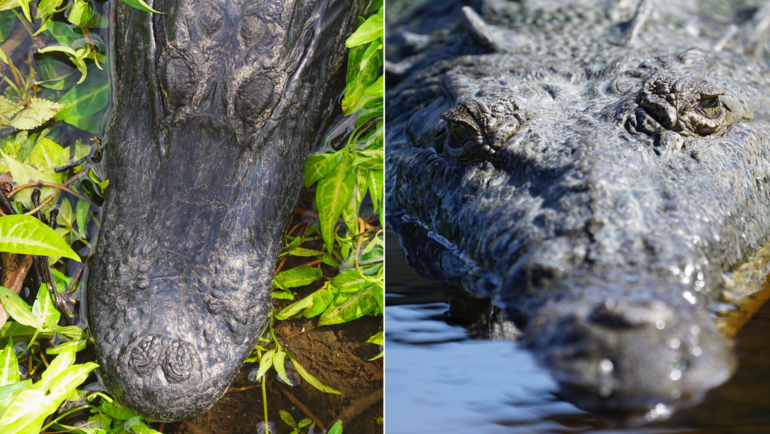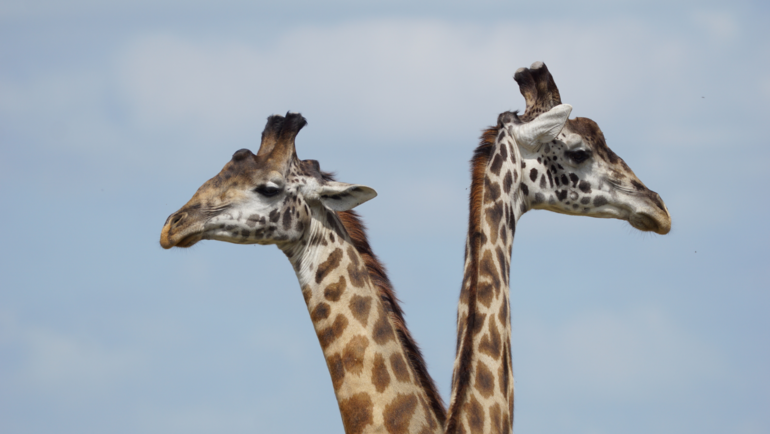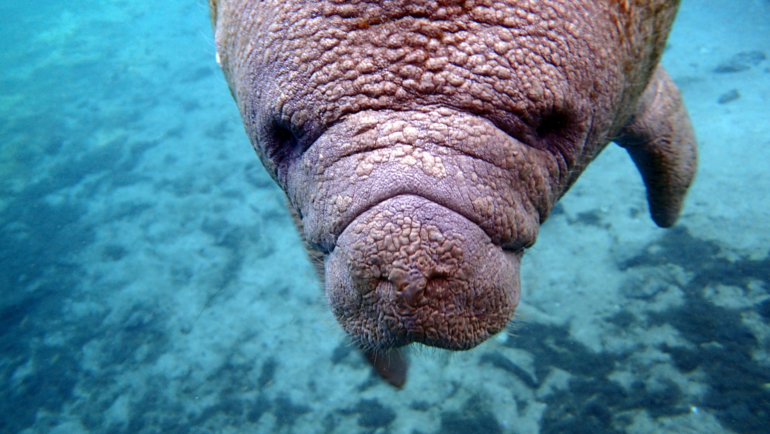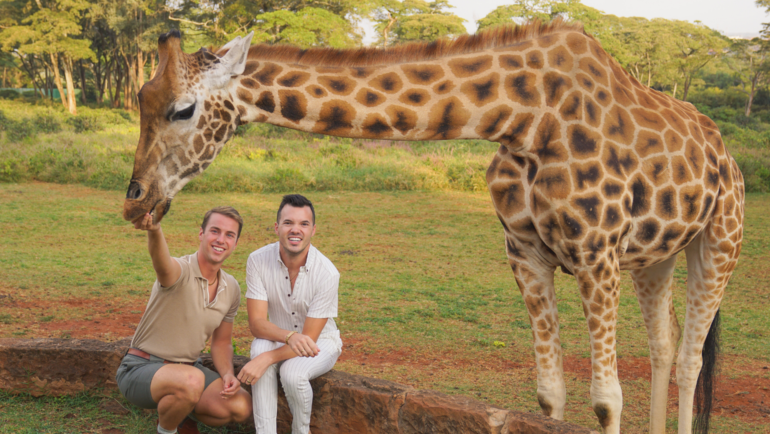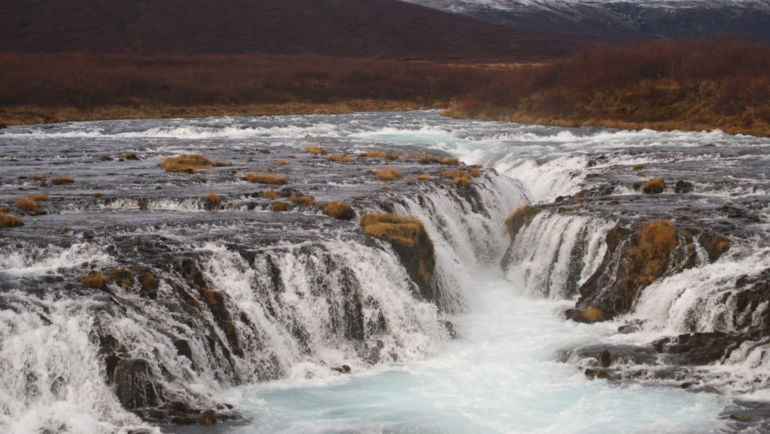Many insist meeting manatees is an unforgettable experience, but these close encounters come at a cost to Florida’s gentle marine mammals.
Manatees need a little peace and quiet. The reality is – manatee tourism booms when manatees are most vulnerable. Despite their larger-than-life proportions, these giants actually have a hard time keeping themselves warm. During the chilly months between November and March, thousands of manatees congregate in warm spring-fed waters just to survive. But these sanctuary-seeking manatees are often met by tour boats filled with ‘wetsuited’ guests ready to plunge into the crystal blue water for an up-close encounter. In Florida’s Citrus County not only is this practice allowed – it’s engrained deep into the local economy as the ‘Manatee Capital of the World.’ But in this case, just because you can, doesn’t always mean you should. While mingling with manatees might have the legal ‘gray zone go-ahead’ – minding your manners can be the difference between life and death for these beloved marine mammals.
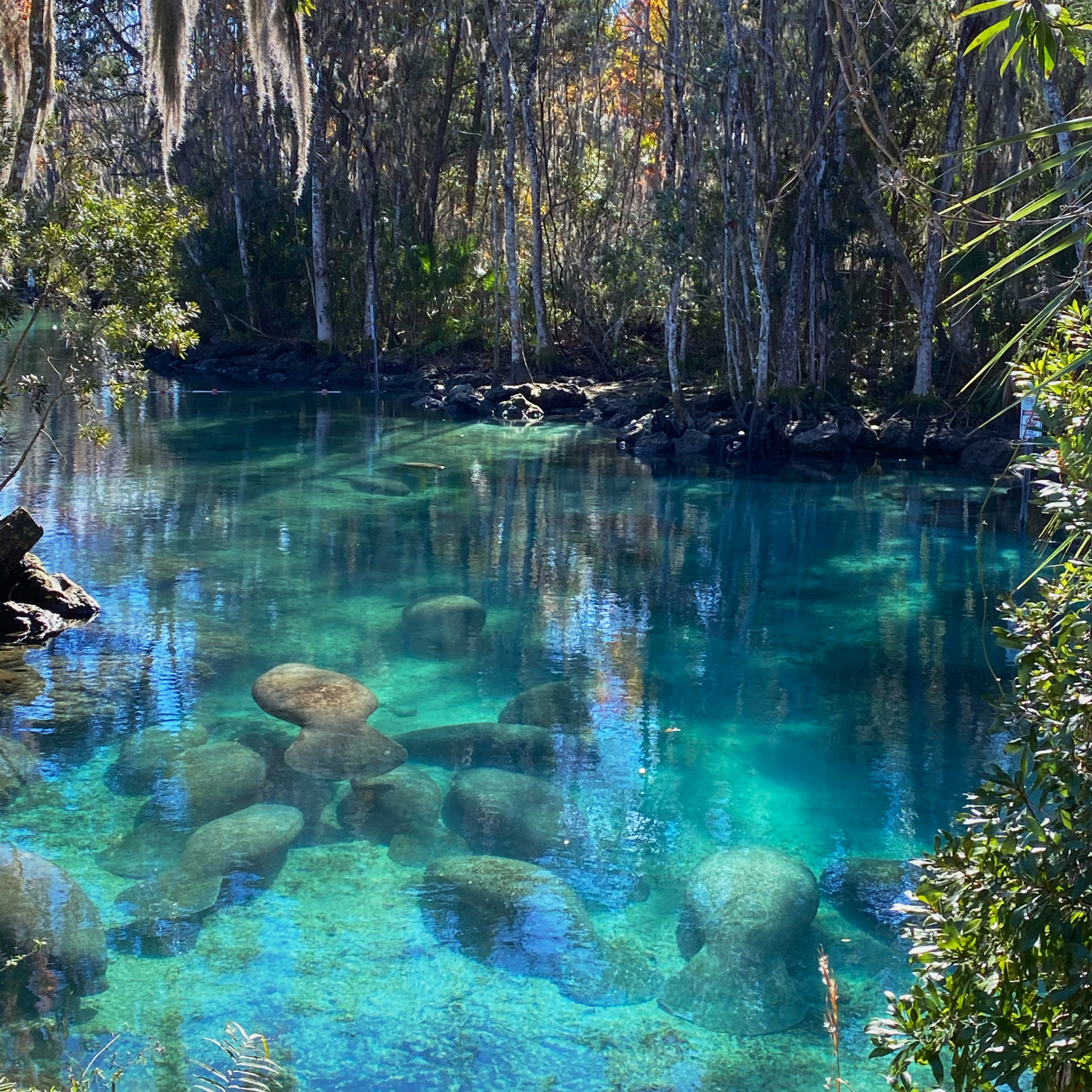
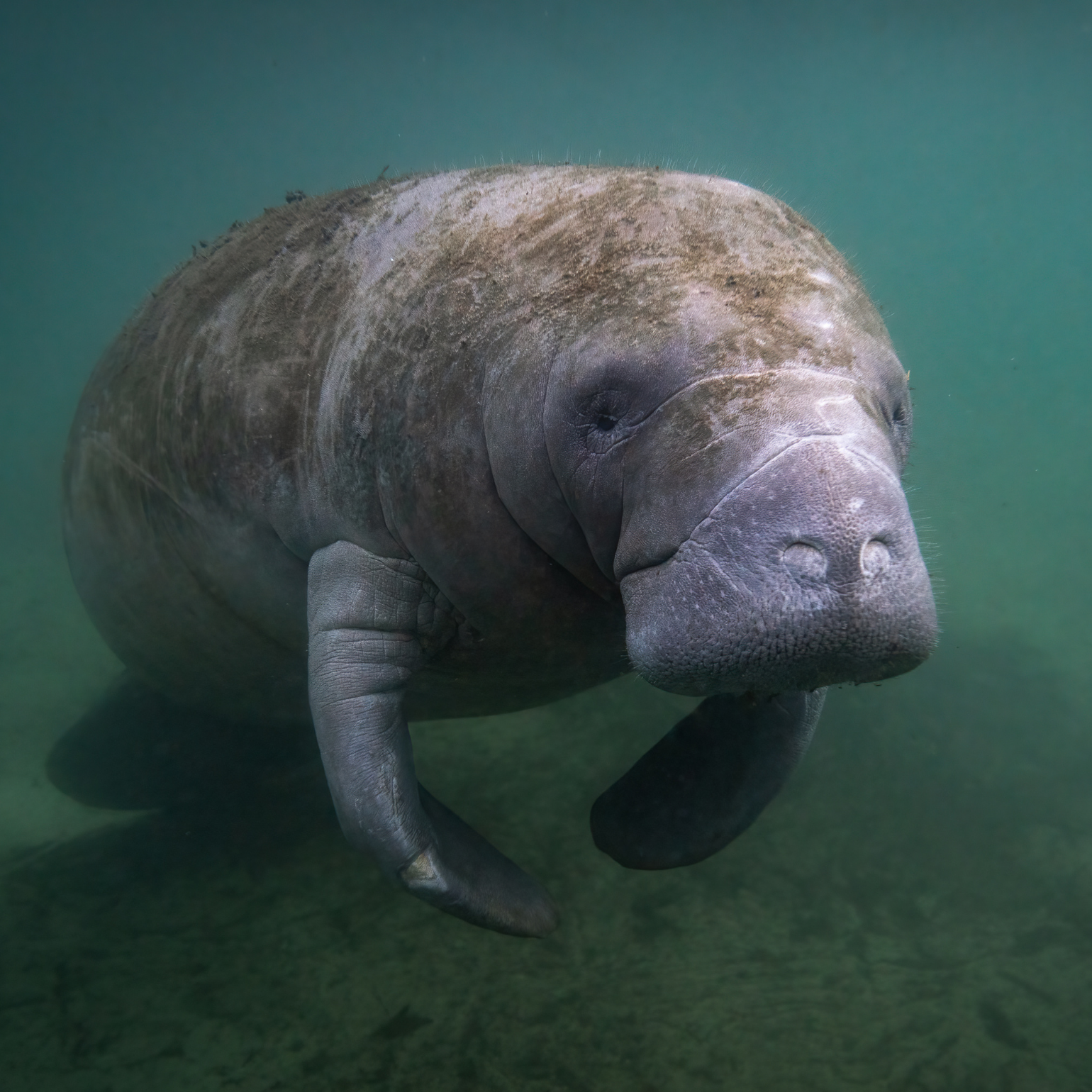
Manatee Capital of the World
In Crystal River, a small town on Florida’s Gulf Coast, manatees are a source of both income and controversy. Touching or interfering with manatees is against the law, but the regulations are only sporadically enforced in Crystal River. Hundreds of thousands of tourists come here each year to swim with the manatees.
As the seasons shift from fall to winter this area becomes a literal hot spot for manatees. The warm spring-fed waters act as a cozy retreat to keep the sea cows safe through the winter. Three Sisters Springs alone draws thousands of manatees congregating in a relatively small area. Their attraction goes further than a pleasant water temp, the reality is manatees simply cannot survive in waters that dip below 60 degrees. Their large size is deceptive, offering almost no insulation from cold water. So when the temperatures drop, manatees make their way from the Gulf of Mexico to these warm springs for the cozy 72-degree environment.
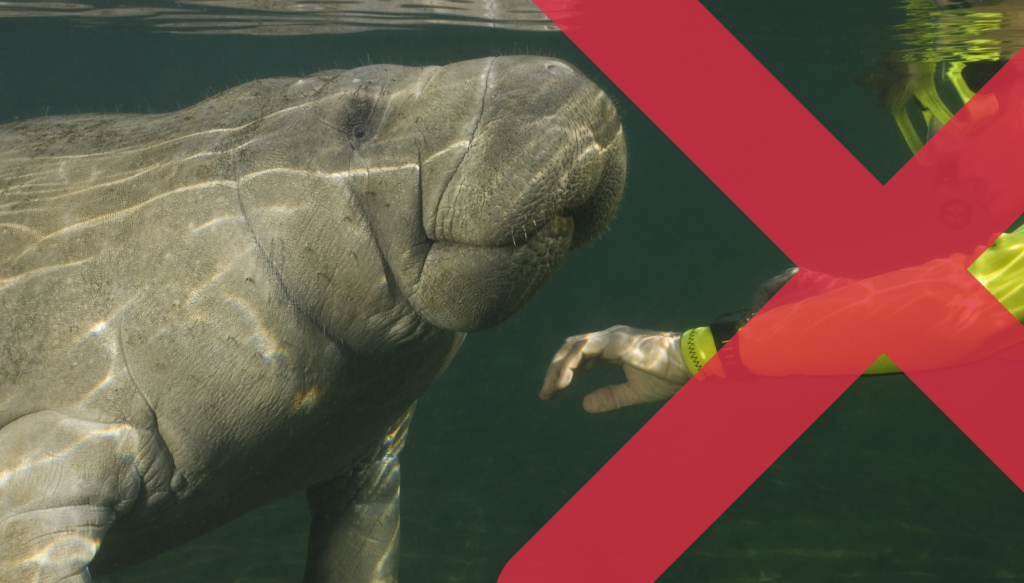
Manatee Meet-and-greet Madness
West Indian manatees are considered a protected species, both under the Marine Mammal Protection Act and also under Florida state law. These protections ensure that manatees aren’t harassed, disturbing their natural behaviors. Safeguards like these are vital to this vulnerable population. In 2021 alone over 1,100 manatees were lost, representing nearly 13% of Florida’s entire manatee population. Their biggest threat is starvation, driven by a diminishing food source of seagrasses caused by polluted waters. But boat strikes and human interference are also leading causes of manatee casualties.
Many worry that tourists swimming with manatees disturbs them during a time of year when they are most sensitive. Winter is their stay warm, try to find food, and rest season. But clearly, the rules set in place to moderate tourism practices with manatees are falling short. During peak ‘manatee season’ the onslaught of visitors begins in the early morning and lasts until sunset, bringing boatloads of tourists to the springs. Mostly well-intended visitors on kayaks, canoes, and even snorkeling the waters are, intentionally or not, disturbing the manatees. This human traffic in the springs is blocking manatees from getting to safety, and the reality is if they can’t reach the warm waters they can die from hypothermia.
“Many tourism operators in Crystal River promote what they call ‘passive interaction,’ which is a bit of an oxymoron,” says Milo Putnam, founder of Laro – Ethical Wildlife Travels. “Passive wildlife observation doesn’t include touching. Instead, these local businesses should be promoting true passive observation of manatees where they are respectfully watched from a distance.”
Snorkeling tourists reaching out and touching manatees is very disruptive to the animals. While some manatees do engage in interacting with humans, for the most part, they want to be left alone. Habituating manatees to become accustomed to humans alters their natural behaviors, increasing their risk of being struck by boat propellers.
Instead, look but do not touch, to help keep manatees safe. Better yet stay above the water’s surface and leave the warm spring waters as a peaceful realm for these peaceful giants.
Meeting Manatees Ethically
There are multiple options for meeting manatees – ranging from always ethical to extremely disruptive. This spectrum includes everything from swimming with manatees, paddling boarding, motor boating, kayaking, and viewing them from land. But if you’re looking for the ‘most ethical’ option – the least disruptive is viewing manatees from dry land. The best place to observe manatees without getting wet is on the boardwalk around Three Sisters Springs. This crescent-shaped pathway hugs the springs and offers visitors an accessible vantage point to passively enjoy the manatees.
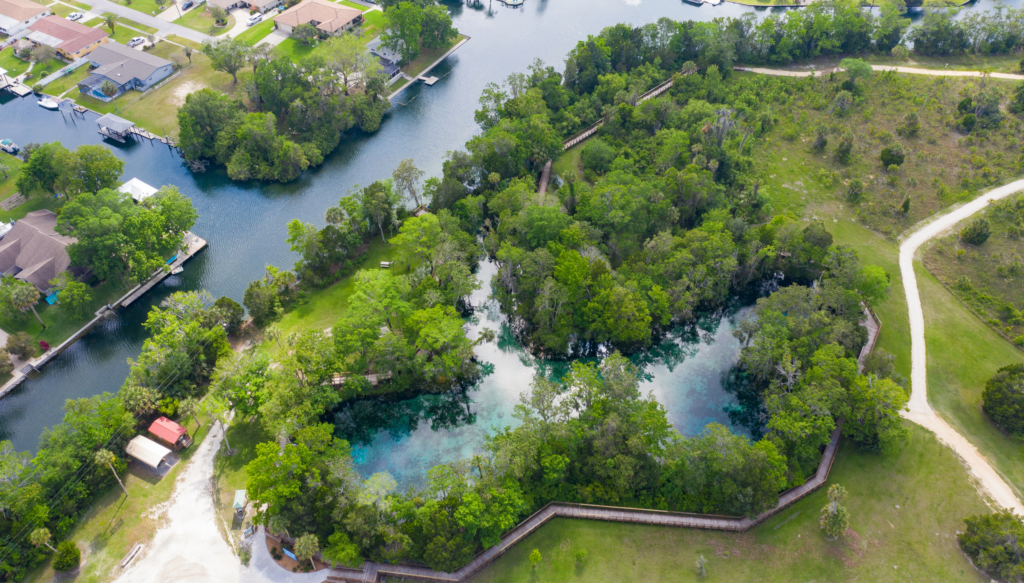
Many tourists crave an even closer encounter with manatees. This is what has created a boom in manatee tourism outfitters in Crystal River. To support ethical viewing practices our recommendation is to book any in-water excursions with outfitters that are certified as Guardian Guides – Manatee Stewardship Program. This stamp of approval was created and endorsed by Save the Manatee Club – Florida’s leading manatee protection non-profit. This voluntary recognition and education program encourages ecotourism providers in Florida to promote stewardship of manatees and their ecosystems. Certified Guardian Guides set out to reduce and even eliminate disturbances to manatees as commercial tourism operators. By booking excursions with Guardian Guide certified companies, you can help foster positive actions that prevent disturbances to manatees.
Manatee Guardian Guidelines
Education is a priority to connect guides to true ecotourism experiences.
– Guides and staff complete onboarding training and annual refreshers provided by Save the Manatee Club.
– Guests are educated during tours on both natural history and ethical viewing practices.
Reduce over-crowding and limit disturbances to manatees by varying times and locations of tours.
– Guides will limit visits to 15 minutes near manatees before moving their group to the next sighting.
– If other tour groups are in the area, guides will wait till they are done before bringing their group closer.
NO TOUCHING! All Guardian Guides closely monitor their guests to control tour experiences.
– Guides will ensure guests are maintaining a respectful distance between themselves and the manatees.
– For in-water tours, guides join guests snorkeling to ensure that the manatees are observed ethically – not touched.
Companies will foster stewardship practices to support the local ecosystems.
– Tour operators will dedicate volunteer hours of 25 hours per boat or 1 hour per paddle craft each year to local environmental projects.
– Or tour operators can dedicate $1 for every tour guest as a donation towards manatee conservation efforts.
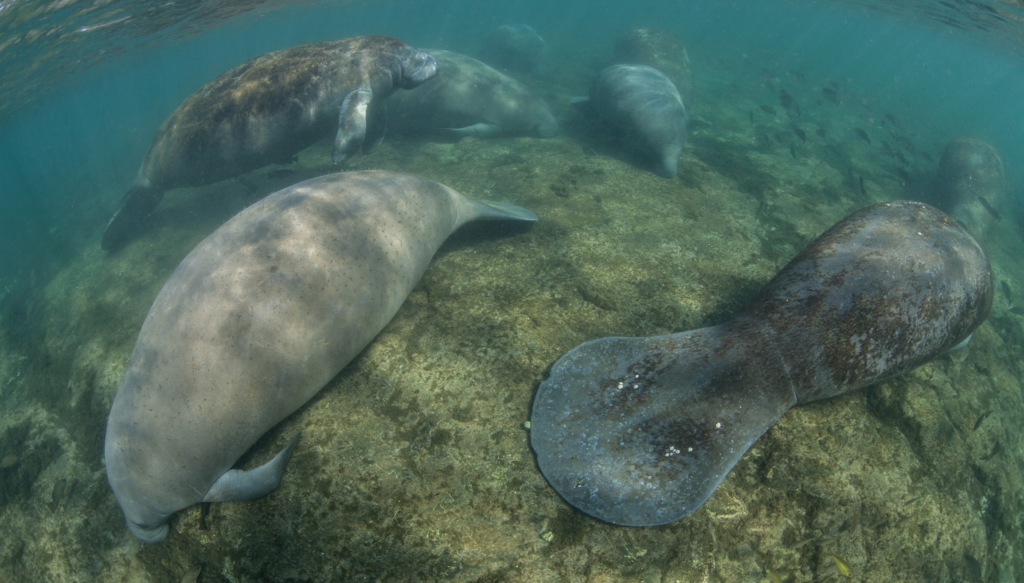
Researching Ethical Manatee Tours
“During our visit to Crystal River in 2016, we discovered conflicting information about ethical viewing practices between tour operators,” says Putnam. “Some outfitters strictly adhered to ‘look but do not touch’ motto while others stated that you could touch with a single open hand. Looking back on our experience I wish there were tighter guidelines to protect the manatees.”
The best resource for supporting ethical viewing practices when it comes to Florida’s beloved manatees is the Guardian Guides – Manatee Stewardship Program, supported by Save the Manatee Club’s belief that the best way to appreciate and support manatees is from a respectful distance.
“I support observing manatees from land and from a distance while kayaking or paddle boarding,” says Putnam. “To limit disturbances to vulnerable manatees trying to stay warm during the winter, it’s best to avoid in-water experiences and instead appreciate these amazing mammals from above the water’s surface.”


